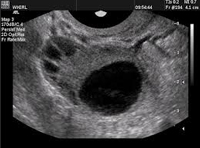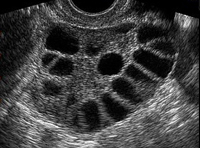Garbba Rakshambigai Fertility Centre has efficient gynaecologists who have been treating patients for the past few decades. Due to their efforts, we have been able to assist patients and treat them in the best way possible. Our gynaecologists have thorough knowledge on the subject.
Polycystic ovary syndrome (PCOS), identified as a complex disorder among women has to be identified at the right time and treated properly. Being the best fertility clinic in Chennai, Garbba Rakshambigai Fertility Centre has treated many women suffering from this disorder over the years.
Polycystic ovary syndrome (PCOS) is a complex disorder (PCOS) that affects 5 to 10% of women who belong to the reproductive age. The name is derived from the presence of multiple fluid cysts found in this condition at the ovary. This can be evidently found from an ultrasound scan of the ovary. This syndrome is characterized by excessive hair growth in face and other body parts, pimples, darkening of skin in addition to the others. All of the above mentioned characteristics suggest hyperandrogenism, obesity, and chronic anovulation which are evident by irregular menses.
Knowing the fact that a woman may be genetically predisposed to developing PCOS, the interaction of environmental factors with the genetic factors, results in the characteristic hormonal and menstrual disturbances associated with Polycystic ovary syndrome (PCOS). The important contributors to the development of Polycystic ovary syndrome (PCOS) are obesity, sedentary lifestyle and poor eating habits.
You may have normal reproductive organs (uterus and fallopian tubes) if you have Polycystic ovary syndrome (PCOS). You may also have one or more of the following signs and symptoms:
• Menstrual disturbances in 70% (Irregular or absent periods, No bleeding to excessive spotting, Cycle lengths more than thirty-five days)
• Obesity( 65- 75%)
• Infertility and miscarriage
• Hair and skin problems (60-70%) (acne, hair loss, excessive facial hair, oily skin etc)
•Adolescent girls who face hair and skin problems along with associated irregular menses.
• Excessive weight gain with irregular menses
• Infertile couples
The most important step in Polycystic ovary syndrome (PCOS) diagnosis is, a careful examination carried out by your physician or a gynaecologist. In case PCOS is suspected, further blood tests, hormonal assays and an ultrasound scan may be required to confirm the diagnosis.
The figures show the ultrasound picture of a polycystic ovary (right) in comparison to a normal ovary (left). The polycystic ovary gives an appearance of multiple black coloured cysts in an ultrasound scan.


The figures show the ultrasound picture of a polycystic ovary (right) in comparison to a normal ovary (left). The polycystic ovary gives an appearance of multiple black coloured cysts in an ultrasound scan.
Polycystic ovary syndrome (PCOS) is associated with several long-term health consequences that affect the overall health in around 30-40% of women, apart from the gynecological problems like irregular menses and infertility. Pre-diabetes, metabolic syndrome, heart disease, and type 2 diabetes are included in the consequences. Every 1 out of 3 women with polycystic ovary syndrome (PCOS) have pre-diabetes and other symptoms associated with metabolic syndrome. If not treated properly, the above conditions may lead to diabetes and other serious illnesses.
Getting pregnant while living with Polycystic ovary syndrome (PCOS) is a challenge, as your body doesn’t produce the hormones necessary for regular ovulation. The egg inside the ovary cannot mature without these hormones. The follicle that holds the egg continues to grow and gets filled with fluid. Due to the absence of mature egg, it remains as a cyst and cannot be ruptured. The cysts with Polycystic ovary syndrome (PCOS) produce higher androgens (male sex hormones), than the normal amounts which will block ovulation. Since there is no mature egg released, ovulation fails to occur and the hormone progesterone is not made. This leads to an irregular or absent menstrual cycle. Polycystic ovary syndrome (PCOS) which is a leading cause of infertility, can make your life complex if you don’t take proper medical guidance.
• Weight reduction :
The first line of treatment which is recommended is weight loss. Around 65% to 75% of women with Polycystic ovary syndrome (PCOS) are found to obese. Obesity is said to have a high significance on reproductive outcome. If a woman's body mass index (BMI) is found to be greater than 35, the time to conceive increases from 2-fold to 4-fold. Obesity not only influences time to conceive but also adversely affects the response to fertility treatment. In addition, it also has a negative influence on pregnancy and may also lead to pregnancy related complications. At Garbba Rakshambigai Fertility Centre, our dietitian will prescribe a diet chart designed to reduce weight without making you starve or otherwise affecting the nutritional status of the body. We also stress on an exercise program that will help with weight reduction, and also improve your overall stamina and well-being. Some patients may be advised to take weight reduction medicines, to achieve the target body weight.
• Hormonal therapy :
Women who have irregular menstrual cycle, abnormal hair growth,
pimples from Polycystic ovary syndrome (PCOS) are treated with low dose hormonal medicines to correct these symptoms.
• Fertility treatment :
Women with Polycystic ovary syndrome (PCOS) usually require medical help for conception and they have several treatment options available for such patients.
• Medicines that restore ovulation : Medicines like clomiphene and several injectable hormonal medicines have the ability to interrupt the pathology in Polycystic ovary syndrome (PCOS) and boost the development of follicles. This enables the development of an ovum which can be later released for fertilization. Since anovulation or inability to form and release an ovum is an important cause of infertility in Polycystic ovary syndrome (PCOS), such medicines can result in a successful pregnancy as their effect on ovulation can address infertility.
• Metformin : Polycystic ovary syndrome (PCOS) is accompanied with the resistance to insulin and a pre-diabetic state. The sensitivity of the tissues to insulin is increased by a medicine called Metformin. Metformin also helps to lower insulin levels and to prevent development of diabetes. The fertility drugs for Polycystic ovary syndrome (PCOS) are often taken in combination with metformin.
• IVF : When there is a repeated failure with basic fertility drugs, In vitro fertilization (IVF) is a great option for getting pregnant with Polycystic ovary syndrome (PCOS). Though In-vitrofertilisation (IVF) is an expensive and time-consuming process, many women with Polycystic ovary syndrome (PCOS) have had great success with In-vitrofertilisation (IVF), getting pregnant and bringing home healthy babies.
Talk to us if you have any queries on Polycystic ovary syndrome (PCOS). We have an expertized team to guide you on the causes, treatment, diagnosis